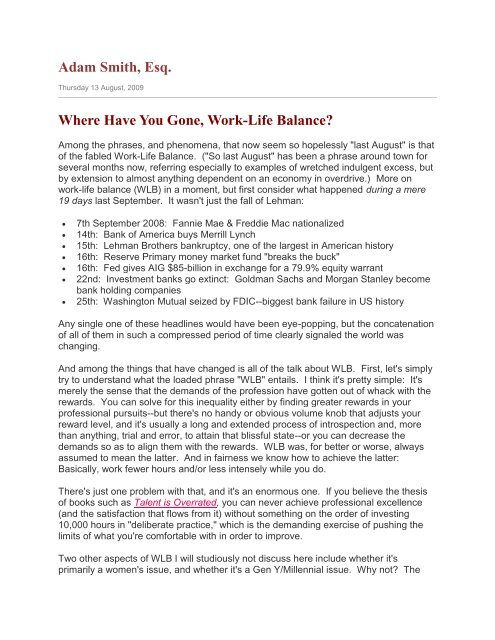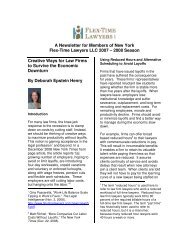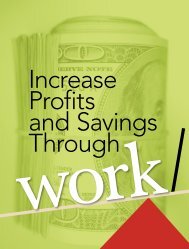Adam Smith, Esq. Where Have You Gone, Work-Life Balance?
Adam Smith, Esq. Where Have You Gone, Work-Life Balance?
Adam Smith, Esq. Where Have You Gone, Work-Life Balance?
Create successful ePaper yourself
Turn your PDF publications into a flip-book with our unique Google optimized e-Paper software.
<strong>Adam</strong> <strong>Smith</strong>, <strong>Esq</strong>.<br />
Thursday 13 August, 2009<br />
<strong>Where</strong> <strong>Have</strong> <strong>You</strong> <strong>Gone</strong>, <strong>Work</strong>-<strong>Life</strong> <strong>Balance</strong>?<br />
Among the phrases, and phenomena, that now seem so hopelessly "last August" is that<br />
of the fabled <strong>Work</strong>-<strong>Life</strong> <strong>Balance</strong>. ("So last August" has been a phrase around town for<br />
several months now, referring especially to examples of wretched indulgent excess, but<br />
by extension to almost anything dependent on an economy in overdrive.) More on<br />
work-life balance (WLB) in a moment, but first consider what happened during a mere<br />
19 days last September. It wasn't just the fall of Lehman:<br />
<br />
<br />
<br />
<br />
<br />
<br />
<br />
7th September 2008: Fannie Mae & Freddie Mac nationalized<br />
14th: Bank of America buys Merrill Lynch<br />
15th: Lehman Brothers bankruptcy, one of the largest in American history<br />
16th: Reserve Primary money market fund "breaks the buck"<br />
16th: Fed gives AIG $85-billion in exchange for a 79.9% equity warrant<br />
22nd: Investment banks go extinct: Goldman Sachs and Morgan Stanley become<br />
bank holding companies<br />
25th: Washington Mutual seized by FDIC--biggest bank failure in US history<br />
Any single one of these headlines would have been eye-popping, but the concatenation<br />
of all of them in such a compressed period of time clearly signaled the world was<br />
changing.<br />
And among the things that have changed is all of the talk about WLB. First, let's simply<br />
try to understand what the loaded phrase "WLB" entails. I think it's pretty simple: It's<br />
merely the sense that the demands of the profession have gotten out of whack with the<br />
rewards. <strong>You</strong> can solve for this inequality either by finding greater rewards in your<br />
professional pursuits--but there's no handy or obvious volume knob that adjusts your<br />
reward level, and it's usually a long and extended process of introspection and, more<br />
than anything, trial and error, to attain that blissful state--or you can decrease the<br />
demands so as to align them with the rewards. WLB was, for better or worse, always<br />
assumed to mean the latter. And in fairness we know how to achieve the latter:<br />
Basically, work fewer hours and/or less intensely while you do.<br />
There's just one problem with that, and it's an enormous one. If you believe the thesis<br />
of books such as Talent is Overrated, you can never achieve professional excellence<br />
(and the satisfaction that flows from it) without something on the order of investing<br />
10,000 hours in "deliberate practice," which is the demanding exercise of pushing the<br />
limits of what you're comfortable with in order to improve.<br />
Two other aspects of WLB I will studiously not discuss here include whether it's<br />
primarily a women's issue, and whether it's a Gen Y/Millennial issue. Why not? The
first craven and meanspirited assumption ghettoizes half the human race, and the<br />
second amounts to the feckless and self-indulgent attempt to "stand astride history,<br />
yelling 'stop!'." The point is that neither engages WLB on the merits; both are nasty and<br />
somewhat immature ad hominem reflexes.<br />
My theory about WLB is rather simpler: It waxes and wanes in synch with demand and<br />
supply in the lawyer talent market:<br />
<br />
<br />
When the economy, deal-making, and firms are all booming, and when the greatest<br />
constraint on capacity is available talent, firms will worship at the shrine of WLB in<br />
order to try to make themselves attractive to a wider cohort of the (fixed number) of<br />
law school graduates.<br />
When, as now, voluntary attrition is nonexistent and law students are entering<br />
recruiting season with expectations ranging from "extremely confident lawreviewers<br />
to those expecting to receive zero offers" (as a top 10 school student<br />
reported to me in an email), or when students are offering to work for name-brand<br />
firms for free (also a true story), then the balance of negotiating power has shifted.<br />
I offer as anecdote this January 2008 story from the NYT, "Who's Cuddly Now? Law<br />
Firms," celebrating that:<br />
"There are things happening everywhere, enough to call it a movement," said Deborah<br />
Epstein Henry, who founded Flex-Time Lawyers, a consulting firm that creates<br />
initiatives encouraging work-life balance for law firms, with an emphasis on the retention<br />
and promotion of women. "The firms don't think of it as a movement, because it is<br />
happening in isolation, one firm at a time. But if you step back and see the whole<br />
puzzle, there is definitely real change."<br />
The article also noted the efforts of the suddenly-invisible "Law Students Building a<br />
Better Legal Profession" and their efforts to rank firms based on how well they treat<br />
associates.<br />
Both seem certain signs of a "market top" in WLB.<br />
But I believe there's something else even more important here.<br />
As Jack Welch put it last month with his trademark directness, "There's no such thing as<br />
work-life balance. There are work-life choices, and you make them, and they have<br />
consequences." He added that you shouldn't be surprised if you're passed over for<br />
promotions if "you're not there in the clutch."
I would only refine what he has to say slightly, to adapt it to the context of law land:<br />
There are elite, high-performance firms, playing at the top of the global game, and they<br />
are not "lifestyle" firms. They never will be. Don't kid yourself. Or, as the New York<br />
vernacular puts it, "Fugghedaboutit!"<br />
These firms, I hasten to add, are not for everyone. Neither are "lifestyle" firms for<br />
everyone.<br />
My point is simpler: One and the same firm cannot be both.<br />
If you doubt me, the people (or at least readers of LegalWeek) have voted:<br />
But the fun is that you get to vote as well. We'll keep track of the results and have a<br />
followup piece in the near future.<br />
<strong>Work</strong>-life balance is (multiple choices OK):<br />
Flatly incompatible with firms performing at the highest levels<br />
Achievable in firms of all stripes given flexibility<br />
A useful notion only in the "lifestyle" cohort of firms<br />
An indulgence affordable to firms only in times of high lawyer demand<br />
A humane and "evergreen" virtue responsive to reality<br />
Compatible with high performance if it helps retain talent<br />
A weak accomodation to lawyers who aren't serious<br />
A disservice to high-performing professionals<br />
So last August<br />
Vote<br />
View<br />
Free polls from Pollhost.com





